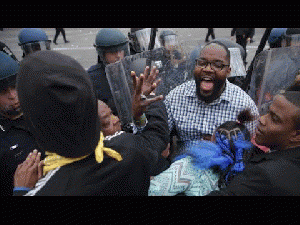Reprinted from Reader Supported News
Incoming attorney general Loretta E. Lynch has opened herself up to charges of conflict of interest in Baltimore less than a week after being sworn in.
Attorney General Lynch has been very vocal about wanting to separate herself from what she views as a tone of conflict between her predecessor Eric Holder and U.S. police agencies.
Lynch reportedly wants greater cooperation between the Department of Justice and American police departments and plans meetings with a number of agencies this summer to enhance cooperation and foster good will.
If Baltimore is to be the first test of her strategy, it highlights the conflicts that can arise when an attorney general mixes political objectives with law enforcement.
When state courts and local justice systems are either unable or unwilling to prosecute police officers accused of crimes, the only remaining recourse is federal. Such federal prosecution falls to the Department of Justice, under the direction of the attorney general. This is particularly true in cases where charges relating to civil rights violations may be brought. The Department of Justice is the Catcher in the Rye when local prosecution fails.
On Tuesday, May 6th, Lynch visited Baltimore. She reportedly met with the family of Freddie Gray, but she also met with a group of about a dozen Baltimore Police officers preparing to begin their shift, saying to them, "Thanks to all of you. I'm looking at the hardest-working police officers in America."
The Department of Justice, federal prosecutors, and the attorney general often work in cooperation with state law enforcement agencies; that is not unusual. However when a department is under direct investigation by the Justice Department, criminal charges are pending, and federal charges are under consideration, contact between DoJ officials and subjects of an investigation typically becomes far more structured. Informal or collegial contact with subjects of an investigation is prohibited under department guidelines.
On April 21st, the Justice Department announced that it was opening a criminal investigation into the death of Freddie Gray while in Baltimore Police custody.
Additionally, during Lynch's trip to Baltimore this week, on the same day that she visited a Baltimore Police Department facility to greet officers there, Mayor Stephanie Rawlings-Blake formally requested, during her meeting with Attorney General Lynch, a federal civil rights probe to examine a wide range of potentially criminal conduct by BPD on a department-wide basis. At issue, Mayor Rawlings-Blake said, was "if our police department has engaged in a pattern of stops, searches or arrests that violate the Fourth amendment."
For Lynch, the conflict arises in her attempts to foster good will and cooperation with a department that is under investigation by the agency she now heads, the DoJ. It brings to mind the contact former attorney general Eric Holder engaged in with JPMorgan Chase CEO Jamie Dimon while the bank was under criminal investigation by the DoJ. Ultimately, JPMorgan Chase agreed to a financial settlement to avoid criminal charges. An option not available to the vast majority of Americans.
For those groups pressing the Obama administration and the Justice Department to act on historic levels of lethal police violence, the time has come and gone for legal action. The combination of unjustified use of deadly force and other serious abuses is dramatically compounded by the widely-held public perception that the police enjoy virtual immunity from prosecution.
Attorney General Lynch should not believe that Freddie Gray will be the last victim of unjustified police violence she will be called upon to confront. Baltimore will not be the last community outraged by the violence visited upon them. It will happen again.
The cornerstone of Attorney General Loretta Lynch's career is her experience as a prosecutor. That is exactly what the situation demands.






